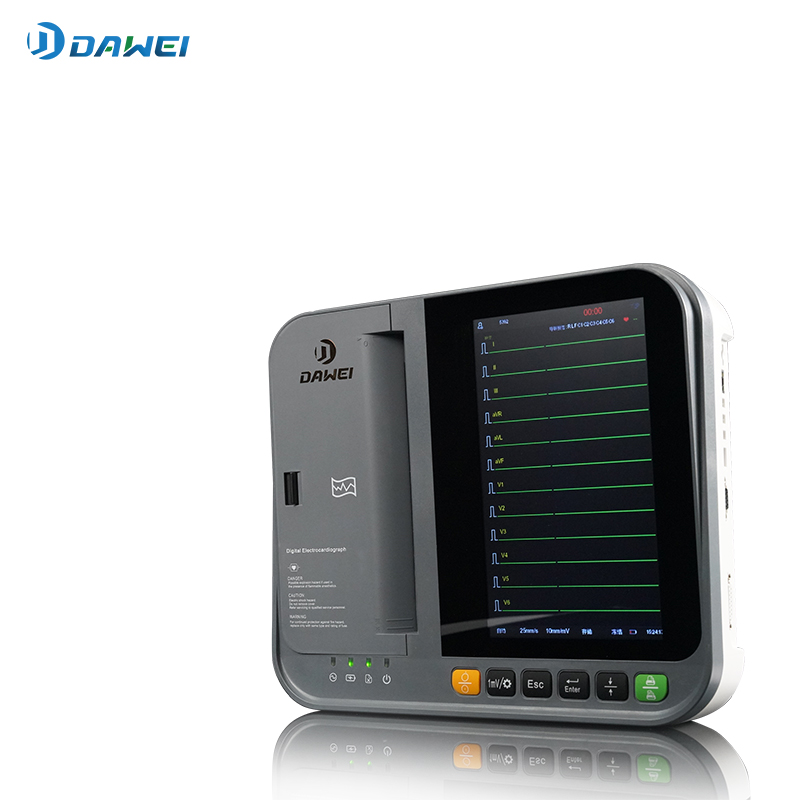Heart disease affects millions worldwide. An accurate diagnosis is crucial for effective treatment. One key tool in heart diagnostics is the ECG machine.
In this article, we'll explore the differences between 6-channel and 12-channel ECG machines. Understanding these differences can help healthcare professionals make informed decisions about which machine to use.
You’ll learn how these machines vary in their capabilities and how choosing the right one can impact diagnosis and treatment.
Exploring the 6-Channel and 12-Channel ECG Machine
What is a 6-Channel ECG Machine?
A 6-channel ECG machine records the heart's electrical signals using six leads. It captures data from six different points, offering a broader picture than simpler devices. This type of ECG machine is helpful in identifying various heart conditions, such as arrhythmias and heart hypertrophy.
By using six leads, the 6-channel ECG machine provides more detailed heart data compared to basic single-lead machines. It helps healthcare professionals detect abnormalities that would be missed with a less comprehensive device. In emergency settings or routine checks, it’s a valuable tool for diagnosing heart conditions more accurately.
What is a 12-Channel ECG Machine?
A 12-channel ECG machine offers a more comprehensive heart assessment. It uses twelve leads, which capture electrical signals from multiple angles. This allows the machine to detect a broader range of heart issues, from minor abnormalities to serious conditions like coronary artery disease.
Compared to the 6-channel ECG machine, the 12-channel ECG machine provides a clearer, more complete picture of the heart’s electrical activity. This makes it an essential tool for cardiologists dealing with complex heart conditions. It’s commonly used in hospitals for diagnosing myocardial infarctions (heart attacks) and assessing heart function in patients with known cardiovascular disease.
Key Differences Between 6-Channel and 12-Channel ECG Machines
| Feature | 6-Channel ECG Machine | 12-Channel ECG Machine |
| Number of Leads | 6 leads | 12 leads |
| Data Detail | Less detailed, suitable for basic checks | More detailed, suitable for complex diagnoses |
| Recording Speed | Slower, records one lead at a time | Faster, records all leads simultaneously |
| Efficiency | Less efficient for complex diagnostics | More efficient, faster results, suitable for emergencies |
| Diagnostic Use | Good for routine evaluations | Ideal for advanced heart condition diagnostics |
| Accuracy of Results | Provides a basic overview of heart health | More accurate with better data points and detailed analysis |
| Heart Condition Diagnosis | Limited to basic issues | Comprehensive, detects arrhythmias, heart attacks, etc. |
![12-Channel ECG Machines 12-Channel ECG Machines]()
Practical Applications of 6-Channel and 12-Channel ECG Machines
When to Use a 6-Channel ECG Machine?
Basic Heart Condition Diagnosis
A 6-channel ECG machine is perfect for basic heart condition assessments. It is often used for routine check-ups in clinics. This machine helps doctors get a clear view of the heart's electrical activity but is more affordable than its multi-channel counterparts.
It's an excellent choice when diagnosing less complex heart issues. Clinics with simpler diagnostic needs find it especially useful. For everyday check-ups, it does the job well.
Common Conditions Diagnosed with a 6-Channel ECG Machine
The 6-channel ECG machine is typically used to detect arrhythmias, minor heart abnormalities, and basic evaluations. It can identify issues like irregular heartbeats, which are crucial for early detection. However, it may not be as detailed in diagnosing more complex heart conditions.
When to Use a 12-Channel ECG Machine?
Advanced Diagnostic Tool
For hospitals, cardiac clinics, and research centers, the 12-channel ECG machine is the go-to tool. It provides an in-depth look at the heart’s electrical activity. This is especially useful in diagnosing more complex conditions like coronary artery disease or heart failure.
Unlike the 6-channel ECG machine, the 12-channel offers a more detailed, multi-dimensional analysis. It’s essential in cases where precise diagnostics are necessary for treatment plans.
The Benefits of a 12-Channel ECG Machine
The 12-channel ECG machine offers a comprehensive analysis of the heart. It uses 12 leads to record electrical signals from multiple angles. This extensive data helps in detecting heart attacks, arrhythmias, and other severe heart conditions. The more detailed information provided by a 12-channel ECG makes it ideal for cardiologists looking to diagnose complex heart diseases accurately.
Conclusion
The 6-channel ECG machine is ideal for basic heart condition diagnosis, providing quick, cost-effective results. However, the 12-channel ECG machine offers detailed, multi-dimensional analysis, suitable for diagnosing complex heart conditions like coronary artery disease and myocardial infarction.
If you need quick and affordable heart health assessments, a 6-channel ECG machine is a solid choice. For more in-depth diagnostics, especially in hospital settings, the 12-channel ECG machine is the better option. Dawei Medical offers reliable ECG machines to meet your needs, ensuring high-quality results and ease of use.
FAQs
1.Can a 6-channel ECG machine be used for all types of heart diagnoses?
A 6-channel ECG machine can effectively diagnose basic heart conditions but may not be sufficient for complex cases that require a more detailed analysis, which a 12-channel ECG machine provides.
2.How does cost affect my choice of ECG machine?
6-channel ECG machines are more affordable, making them a great choice for smaller clinics or general practices. 12-channel ECG machines are more expensive but essential for hospitals and cardiac centers that deal with advanced diagnostic needs.
3.Which ECG machine provides more accurate results?
12-channel ECG machines are more accurate for diagnosing intricate heart conditions, as they record electrical activity from multiple angles, offering a comprehensive view.
English
العربية
Français
Русский
Español
Português
Deutsch
italiano
日本語
한국어
Nederlands
Tiếng Việt
ไทย
Polski
Türkçe
ພາສາລາວ
ភាសាខ្មែរ
Bahasa Melayu
ဗမာစာ
Filipino
Bahasa Indonesia
magyar
Română
Čeština
Монгол
қазақ
Српски
हिन्दी
Slovenčina
Slovenščina
Norsk
Svenska
українська
Ελληνικά
Suomi
Հայերեն
עברית
Latine
Dansk
Shqip
বাংলা
Hrvatski
Afrikaans
Gaeilge
Eesti keel
Māori
नेपाली
Oʻzbekcha
Български
ქართული
Кыргызча















